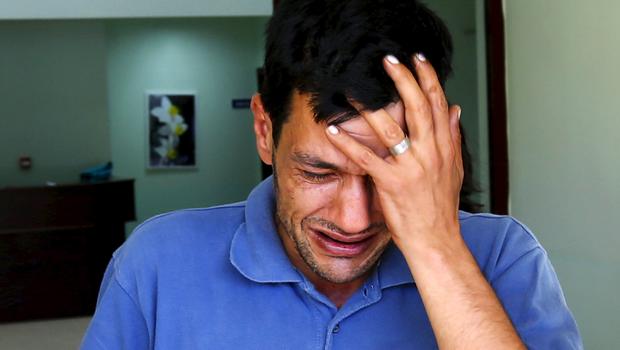 Last week, a county clerk in Kentucky blew up your social media feed.
The Supreme Court legalized gay marriage earlier this year. In light of this ruling, James Yates and Will Smith went to their local courthouse to obtain a marriage license. County Clerk Kim Davis refused to issue a marriage license to them.
Last week, a county clerk in Kentucky blew up your social media feed.
The Supreme Court legalized gay marriage earlier this year. In light of this ruling, James Yates and Will Smith went to their local courthouse to obtain a marriage license. County Clerk Kim Davis refused to issue a marriage license to them.
Mrs. Davis has cited her Christian beliefs as the reason for refusing the marriage license.
She has since been held in contempt of court for refusing to comply with the orders of the federal court system.
If you search for #kimdavis on social media, you're going to spend most of your time reading about somebody on the fast track to sainthood and a new American hero...or a simpleminded, bigoted law breaker.
We continue to demonstrate that we aren't very good at having a discussion in our society, but we're great at having arguments.
We've been trained by 24 hour cable news and politicians and various other outlets that the best way to communicate my viewpoint is by trashing the opposing viewpoint. If you don't agree with me, you're not just wrong, you're also evil and dangerously stupid.
As somebody who wants my faith to impact my daily life, I don't want to be part of insulting, hateful arguing. So what can I learn from this situation - that is, how can I be part of conversation and discussion rather than fighting?
1. Start with respect.
Kim Davis is not a monster. Neither are James Yates and William Smith, the couple who tried (unsuccessfully) to get a marriage license on multiple occasions from Mrs. Davis.
None of them wake up in the morning and ask "How can I undermine the fabric of humanity today?"
Clearly they have different viewpoints on what is right and what is wrong in the case of gay marriage.
We'll get into that in a minute.
As a Christian, I must believe that each person in this argument - including internet trolls on both sides - are made in the image of God. Every single person bears God's imprint.
Next time you're about to call someone a moron or an idiot, remember Matthew 5:22 where Jesus says:
"But I say, if you are even angry with someone, you are subject to judgment! If you call someone an idiot, you are in danger of being brought before the court. And if you curse someone, you are in danger of the fires of hell."
Now that probably hits our ears as a threat - if you get angry and insult or curse someone, you're going to get some kind of spiritual payback. God's gonna get you, so to speak.
But what if Jesus isn't threatening us, but he's warning us in a loving way? What if he's essentially telling us that when we start making ourselves superior to other people, it can lead to our own destruction?
Jesus loves us. If he's giving us a warning, it's for our own good. We need to start with valuing other people - not devaluing them - because God loves them as much as he loves us.
2. Seek to understand the other viewpoint.
Let's take a minute and get introspective. You have an opinion on gay marriage. The way you got to that opinion was by running the topic through your personal worldview. That worldview is influenced by your experiences, your culture, your faith, your family and peers, your education, etc.
Realize that it is completely reasonable for a person with wildly different experiences, culture, family, friends, etc to come to a different conclusion than you.
The preachers outside the courthouse are doing their best to help people. The people ripping those preachers to shreds online are doing their best to help people.
If you can start from that assumption, that the 'other side' isn't satan's personal envoy to you, you can actually start to talk instead of argue.
3. Don't choose a side.
When you pick a side, it becomes necessary for you to prove the other side wrong.
So don't choose a side. Choose to love people.
You can hold an opinion, but when your opinion is more important to you than other people, you're out of line with God's values.
Jesus shared plenty of unpopular opinions, but he did it in such a loving way that everyone wanted to be around him, including what Matthew 9:11 refers to in one translation as the 'scum' of society.
Pretty much everyone (except the exceptionally self righteous) wanted to be around Jesus because he was the most upright, noble person who ever lived and he made them feel better about themselves. He made them want to have a better relationship with God.
Christians are not God's police officers. We are God's ambassadors. If Azerbaijan sent ambassadors to DC who walked the streets telling Americans how bad and dumb they were, nobody would want to go visit Azerbaijan.
People won't hear what we have to share if all we're doing is trying to prove them wrong.
___
We have an amazing opportunity to have huge conversations across the globe thanks to social media. Wasting that opportunity on insults and vitriol is a huge mistake.
I love Kim Davis, I love James Yates and I love William Smith and I want to be part of the conversation they have prompted.
I want my involvement to point to the fact that we are all made by God and loved by God so that people want to keep hearing what I have to say. Because the best way to have influence of any kind is to be invited to participate. Maybe that's why Jesus made such a difference.









 Last week, a county clerk in Kentucky blew up your social media feed.
The Supreme Court
Last week, a county clerk in Kentucky blew up your social media feed.
The Supreme Court 